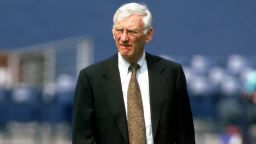The Houston Texans announced Monday the hiring of defensive coordinator Lovie Smith as the franchise’s next head coach.
Smith has previously served as a head coach twice in the NFL for 11 seasons with the Chicago Bears and Tampa Bay Buccaneers. He joined the Texans’ staff prior to the 2021 season from the University of Illinois at Urbana-Champaign, where he was the school’s head football coach from 2016 to 2020.
Smith, who is Black, is the second person of color to be hired as an NFL head coach this offseason. The Miami Dolphins announced Sunday they hired Mike McDaniel, who is multiracial, as their new head coach.
“I have so many friends, family, teammates and coaches to thank for supporting me and helping me continue to do what I love, which is teaching and developing players,” said Smith, per a team statement. “I understand the responsibility I have to this organization and this city to develop a championship-level program. I’m ready to get to work and build it together.”
“A proven winner, Lovie has shown the ability to develop players both on and off the field for years,” said Texans general manager Nick Caserio. “We had numerous discussions with countless coaches, executives, and players, and what revealed itself is that Lovie has both the leadership and people skills it takes to lead us forward.
“We both understand how much work is in front of us, but we embrace the responsibility and look forward to continuing to build a program that can have sustained success.”
Smith takes over as head coach of the Texans from David Culley, who was fired at the end of the regular season.
Smith spoke on the NFL’s diversity issues
During a news conference Tuesday, Smith did not shy away from addressing the limited number of Black head coaches in the NFL when asked about the issue.
“I realize the amount of Black head coaches there are in the National Football League. There’s Mike Tomlin and I think there’s me, I don’t know of many more. So there’s a problem, and it’s obvious for us. And after there’s a problem, what are you going to do about it?” Smith said.
Smith also voiced his opinion on how to bring greater diversity to the NFL coaching ranks, saying people in positions of power – head coaches and general managers – need to be deliberate about “trying to get more Black athletes in some of the quality control positions just throughout your program.”
“If you get that, they can move up, that’s one way to get more,” he said. “It’s not just an interview, if you’re interviewing a Black guy, it’s about having a whole lot of guys to choose from that look like me. And it’s just not about talk, you look at my staff, that’s what I believe in. And letting those guys show you who they are. That’s how we can increase it, then it’s left up to people to choose. We all have an opportunity to choose, and that’s how I think we’ll get it done.”
Caserio said no one can refute the lack of Black coaches in a predominantly Black league.
“That’s an issue the league has to address, and I think they’re committed to addressing, and I think collectively all of us, whatever our roles are, we have to be willing and committed to be part of that change too, whatever that looks like.”
Brian Flores, the former Dolphins head coach who is currently suing the NFL, New York Giants, Denver Broncos and Dolphins for alleged racial discrimination, was interviewed for the head coaching position with Houston.
After the hiring of Smith was announced, lawyers representing Flores said they were happy the team hired a Black man to lead the Texans but “would be remiss not to mention that Mr. Flores was one of three finalists for the Texans’ head coach position and, after a great interview and mutual interest, it is obvious that the only reason Mr. Flores was not selected was his decision to stand up against racial inequality across the NFL.”
Caserio said at this point, the lack of diversity in coaching in the NFL just needs a solution.
“I certainly don’t have all the answers,” he said. “I can’t even begin to fathom what that answer or solution is, but to be a part of the solution, that’s what we can make a commitment to doing.”







